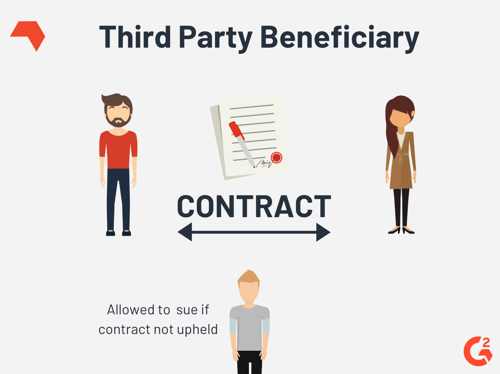Contracts often have lots of legal jargon and extra wording, making it tough to understand exactly what they’re saying.
Contract law is not simple by any means. Occasionally you may encounter a section in a contract detailing a third party beneficiary. Sections or clauses about these types of beneficiaries can drastically change the performance of a contract.
What is a third party beneficiary?
A third party beneficiary is a person that stands to benefit from a contract or can be hurt by its breach, in which case they can sue.
Third party beneficiaries seem simple in theory, but in practice, they can present some interesting complications for contract compliance. Keep reading to have everything clearly explained so that you can approach your contract with confidence.
Third party beneficiary
As early as 1806, American courts started recognizing that third party beneficiaries have legal rights. In the case of Lawrence v. Fox, Holly loaned $300 to Fox and Fox agreed to pay the $300 to Lawrence to satisfy a debt that Holly owed Lawrence. The New York Court of Appeals found that Lawrence was an intended third party beneficiary of the contract who had rights and could enforce the contract between Holly and Fox to recover the $300 that was originally loaned.

This is still how third party beneficiaries work in legal proceedings. When contractual obligations are unenforced, the third party beneficiary can enforce the conditions or receive benefits in the case of a breach. In these types of contracts, there are two types of third party beneficiaries.
Donee beneficiary
is a party that benefits from a contract without an exchange of a good or service they provided (a gift). This type of third party beneficiary gratuitously benefits from the contract between two other parties, and has legal rights against the obligor (person bound to contract), but not the donor in the case that the contract is breached.
Creditor beneficiary
is a party that was hired for a good or service to which the other party has contracted someone to offset their obligations (a transfer by value). This creditor also has rights against both parties in the case that the contract was breached because it affects their original agreement.
A third party beneficiary is more than an outsider to a contractual agreement. These beneficiaries have legal rights and may also be strictly specified in a contract. When these third parties are specified, they are referred to as an intended third party beneficiary. Intended beneficiaries have legal rights to enforce contracts, however incidental third parties do not.
Hopefully, this all makes sense for you by now. But what does it look like in practice? The next section shows a few examples of what a third party beneficiary clause could look like in a contract.
Third party beneficiary clause
Third Party Beneficiary. The Holders shall be third party beneficiaries to the agreements made hereunder between the Company and the Guarantors, on the one hand, and the Initial Purchasers, on the other hand, and shall have the right to enforce such agreements directly to the extent they may deem such enforcement necessary or advisable to protect its rights or the rights of Holders hereunder.
Third Party Beneficiary. The Indenture Trustee is an express third party beneficiary of this Agreement and shall be entitled to enforce the provisions of this Agreement as if it were a party hereto.
Third Party Beneficiary. Each Master Servicer shall be considered a third-party beneficiary of this Agreement, entitled to all the rights and benefits hereunder as if it were a direct party to this Agreement.
Contracts can be tough
We know that not everyone is an expert in legal contracts and agreements. Lucky for you, G2 has plenty of data on contract management software you can use to ensure all of your legal agreements, compliance documents, and contract elements are properly handled.
Discover how you can streamline your entire contract lifecycle with contract lifecycle management software.
NOTE: The writer of this article is not an attorney and the purpose of this article is to inform about a legal term. This information should not be taken as legal advice.
 by Mary Clare Novak
by Mary Clare Novak
 by Sharjeel Ahmed
by Sharjeel Ahmed
 by Sudipto Paul
by Sudipto Paul